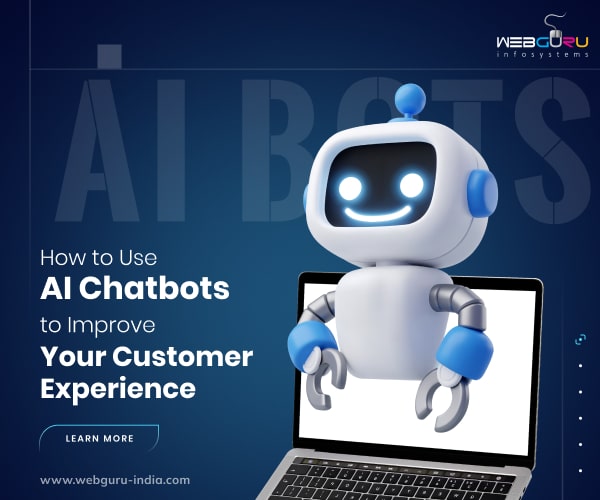Home Blog Website Development How to Use AI Chatbots to Improve Your Customer Experience
How to Use AI Chatbots to Improve Your Customer Experience
- 25 Aug / 2023
- 3,523 views
- 7 Min Read

Today, business enterprises need to deliver top-notch customer experiences to stay relevant and competitive. And AI chatbots have emerged as arguably the best tool to enhance customer experiences. Chatbots are capable of dishing out a host of business-friendly outcomes. These include providing instant responses to customer queries, handling multiple inquiries, and maintaining consistent interactions with customers. Let us see why more and more website development companies are being requested by clients to include AI chatbots in their projects.
Understanding AI Chatbots
Before delving into the practical aspects, let’s lay the groundwork by understanding what AI chatbots are and why they matter.
AI chatbots are intelligent software programs designed to simulate human-like conversations with users. They utilize advanced algorithms and Natural Language Processing (NLP) to understand user input and generate contextually relevant responses.
Benefits of Using AI Chatbots for Customer Service
- 24/7 Availability: Unlike human agents, AI chatbots can operate round-the-clock, ensuring customers receive assistance whenever they need it.
- Scalability: AI chatbots can handle a large number of simultaneous inquiries without compromising response time.
- Consistency: AI chatbots provide consistent responses, reducing the risk of human errors and misinformation.
- Cost-Effectiveness: Implementing AI chatbots can lead to significant cost savings by reducing the need for a large customer support team.
Key Steps to Implement AI Chatbots Effectively
Now that we understand the benefits, let’s dive into the key steps to harnessing the power of AI chatbots:
1. Identifying Use Cases for AI Chatbots
Before embarking on your AI chatbot journey, identify the specific areas where chatbots can make the most impact:
- Frequently Asked Questions (FAQs): Use AI chatbots to instantly address common queries, freeing up human agents for more complex issues.
- Order Tracking and Status Updates: AI chatbots can provide real-time updates on order statuses, minimizing customer anxiety and reducing support requests.
- Troubleshooting and Technical Support: Deploy chatbots to guide users through troubleshooting processes, resolving issues efficiently.
2. Choosing the Right AI Chatbot Platform or Framework
Selecting the appropriate AI chatbot platform is crucial for success:
- Considerations: Look for platforms with strong NLP capabilities, integration options, and customization features.
- Popular Platforms: Explore options like Dialogflow, IBM Watson, and Microsoft Azure Bot Service for building robust chatbot solutions. If you have a WordPress website, there are plenty of popular WordPress chatbot plugins to choose from as well.
3. Data Collection and Preparation
Leverage historical customer interactions to train your AI chatbot effectively:
- Gathering Existing Customer Interactions: Collect past chat logs, emails, and customer inquiries to create a training dataset.
- Creating a Training Dataset for ML: Organize and preprocess the data to facilitate machine learning model training.
4. Designing Conversational Flows
Crafting engaging and intuitive dialogue scripts is pivotal:
- Mapping Out User Journeys: Visualize how customers interact with your chatbot to design effective conversational paths.
- Writing Dialogue Scripts: Craft natural, user-friendly responses that align with your brand’s tone and voice.
- Incorporating Personalization: Tailor responses to the user’s context without intruding on their privacy.
5. Integration with Existing Systems
Ensure seamless integration with your existing infrastructure:
- CRM Integration: Connect your chatbot with Customer Relationship Management (CRM) systems to access customer data.
- eCommerce Platforms: Enable your chatbot to assist with product recommendations and purchasing inquiries.
- Escalation to Human Agents: Implement a mechanism to seamlessly transfer users to human agents when necessary.
Developing an Effective AI Chatbot
With the foundation in place, let’s explore how to develop a high-performing AI chatbot:
1. Choosing the Right Machine Learning Model
Opt for the appropriate model based on your needs:
- Rule-Based vs. NLP-Based Models: Decide whether to use rule-based systems or advanced NLP-based models for conversational intelligence.
- Training and Fine-Tuning: Train the model using your prepared dataset, and fine-tune it to improve accuracy and relevance.
2. Natural Language Processing (NLP) Essentials
Understand the core elements of NLP for effective communication:
- Intent Recognition: Train your chatbot to understand the user’s intentions behind their queries.
- Entity Extraction: Identify specific pieces of information in user input to provide accurate responses.
- Sentiment Analysis: Gauge user sentiment to tailor responses and detect potential issues.
3. Designing for a Human-Like Experience
Humanize your chatbot’s interactions for a more engaging experience:
- Natural Language Generation: Create responses that sound human-like and avoid sounding overly robotic.
- Emulating Empathy and Personality: Infuse your chatbot’s responses with empathy and a touch of personality.
- Handling User Frustration: Equip your chatbot to handle user frustration and difficult conversations gracefully.
Deploying and Testing Your AI Chatbot
It’s time to bring your chatbot to life and ensure it delivers the desired results:
1. Beta Testing and User Feedback
Engage a group of beta testers to refine your chatbot’s performance:
- Selecting Beta Testers: Choose a diverse group of users to provide comprehensive feedback.
- Collecting and Analyzing Feedback: Gather insights on user experiences and identify areas for improvement.
2. Iterative Improvements
Continuously enhance your chatbot based on user interactions:
- Updating Training Data: Regularly update your training dataset with new user interactions to keep the model accurate.
- Refining Conversational Flows: Adjust dialogue scripts based on actual user conversations for optimal user engagement.
3. A/B Testing for Optimization
Fine-tune your chatbot’s performance with A/B testing:
- Testing Dialogue Variations: Experiment with different response options to identify the most effective ones.
- Measuring Success Metrics: Track metrics such as response time and user satisfaction to evaluate improvements.
Monitoring and Maintaining Your AI Chatbot
Sustaining your chatbot’s performance is crucial for long-term success:
1. Regular Performance Evaluation
Monitor your chatbot’s effectiveness and make necessary adjustments:
- Monitoring Accuracy and Effectiveness: Continuously evaluate how well your chatbot is addressing user queries.
- Identifying and Addressing Bottlenecks: Analyze where conversations tend to break down and optimize those areas.
2. Handling Ethical Considerations
Ensure responsible and ethical chatbot usage:
- Dealing with Bias: Regularly review and adjust your chatbot’s responses to eliminate bias and ensure fairness.
- User Data Privacy and Security: Implement stringent measures to protect user data and privacy.
The Future of AI Chatbots and Customer Experience
Look ahead to the exciting possibilities AI chatbots bring:
- Advancements in AI and NLP: Anticipate more sophisticated and context-aware interactions.
- Multilingual and Multicultural Support: Enable chatbots to communicate seamlessly across languages and cultures.
- Voice-Based AI Assistants: Embrace the rise of voice-driven chatbot interactions.
- Integration with Emerging Technologies: Combine AI chatbots with augmented reality, virtual reality, and more for enhanced experiences.
Conclusion
AI chatbots are no longer futuristic concepts; they are powerful tools that can reshape how businesses engage with their customers. By understanding the principles behind AI chatbots, strategically implementing them, and continuously refining their performance, you can unlock a new realm of customer experiences that drive loyalty and growth. Embrace this technology, and watch your customer service evolve into something truly exceptional. To get the best AI chatbot for your website, hire the services of a top-rated professional website development company.

Shrutarshi Das
Shrutarshi Das is a purveyor of all things digital, with a particular interest in new technological innovations, photography, and gaming.

-
1000+
Happy
Clients -
25+
Countries
Served -
19+
Years of
Trust







